FALL








WHAT ARE WE WORKING ON?
The APS division has been working on many initiatives over the last nine months that align with our 2022 goals. We are over halfway through the year, and it is time to check-in on where we are at, hi-lite some accomplishments, and provide an update on listening sessions and other workgroup activities.

Retention and recruitment remain a top priority. We have made a great deal of progress in our hiring and recruitment activities by collaborating with our human resource partners through the development of a single posting and piloting alternative minimum requirements for APS social services specialists. We worked with Office of Financial Management (OFM) and our labor partners to develop a temporary MOU for overtime exempt staff, we submitted proposals again for this bargaining cycle to recognize the distinct work of APS, we made ‘stay interviews’ a priority, and we recently finalized the contract to aid with our case backlog.
Recently we hired and onboarded a workforce and engagement specialist, Natalie Boulos, hi-lited in this edition of our magazine, who will be researching and analyzing hiring, retention and onboarding practices, developing recommendations, and implementing strategies, procedures, tools, training, and best practices to monitor and enhance recruitment and the overall employee experience within APS.
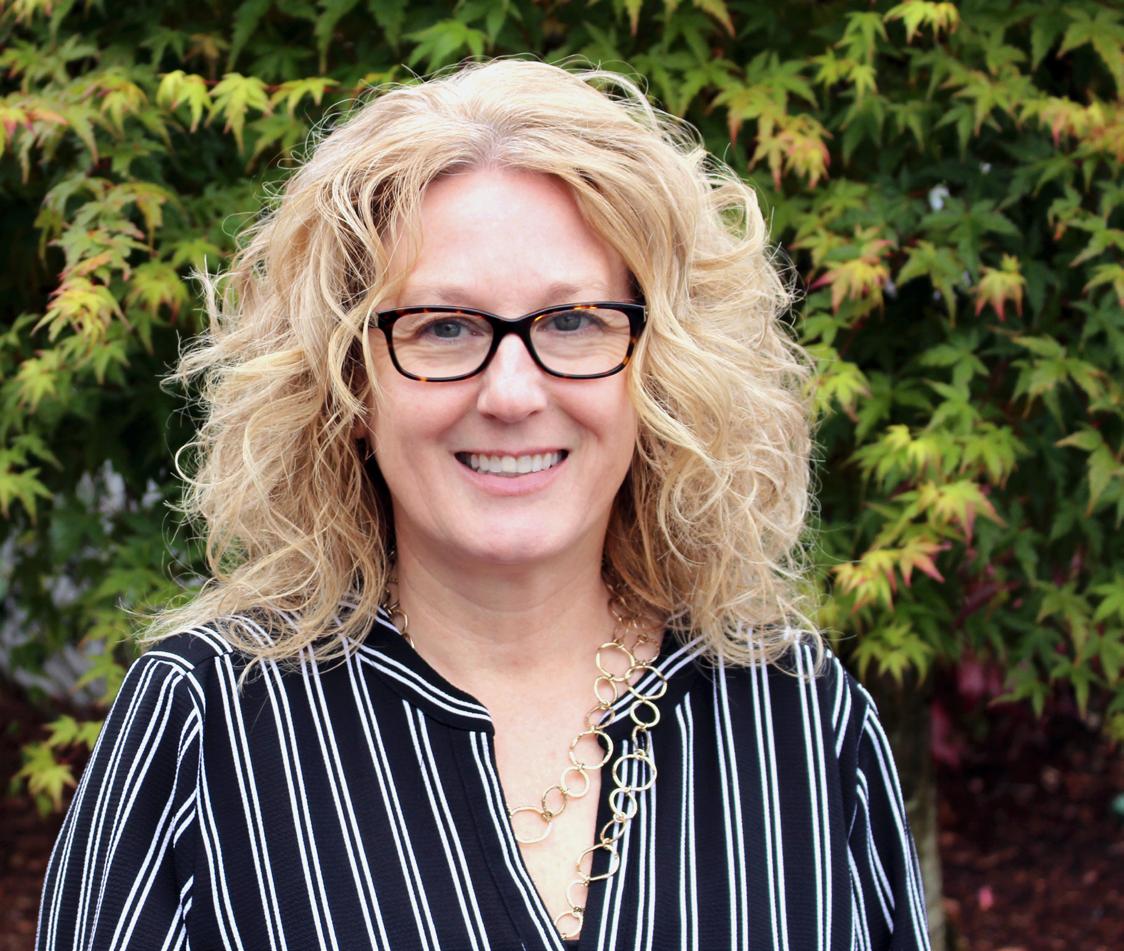
We held 16 listening sessions across the state in late spring and early summer and pulled together a workload workgroup in late summer to focus on improvements. Many workgroups that were in progress prior to the pandemic were halted due to COVID and staffing and workload issues. We will resume some of that work and other focus groups after the first of the year as we further stabilize.
HELLO FROM KATHY MORGAN
As a first step the listening session ideas have been put into themes, such as technology, policy, legislation, workplace improvement, to name a few, with our focused attention on specific ideas and solutions generated from those sessions. Issues that came up that were region or local office specific have been discussed with your regional administrators and will be addressed at the regional level through regional leadership.
Specific recommendations are being assigned out to subject matter experts and reviewed by executive leadership. Feedback loops will continue to be provided through various communications. Some ideas will be incorporated into the workload workgroup and the work we are doing under the grant with ADvancing States related to self-neglect and overall program evaluation being conducted by the University of Washington.
Later this year we will be bringing back members of the workload workgroup for further development of suggestions and strategies related to those ideas and present to extended executive leadership.
In early 2023, we will be bringing back participants from the APS Core Competencies and Hiring Workgroup and creating sub-groups to focus in on critical core competencies and hiring process and practices. This work will be coordinated with the DSHS employer of choice work related to hiring and onboarding.
In addition, we will focus on the three primary themes that we heard through the workgroup and listening sessions and forming lean process and/or workgroups to include:
1) TIVA2 system for changes and enhancements
2) Intake, assignment and screening processes and policies
3) Training related to APS academy future state.
These are just a few things we are working on and have planned for the near future. We will be seeking names from the field and headquarters soon to participate in these lean events and/or workgroups. If you are interested in participating, please let your regional leadership know.
HELLO FROM PAULA HUGHES

Honoring our Tribal Partnerships
Adult Protective Services is committed to serving the people of Washington and maintaining our tribal partnerships. APS regional administrators meet regularly with local tribal leaders and representatives and includes the Office of Indian Policy (OIP) regional managers to ensure ongoing collaboration and cooperation. In addition, there is an Indian Policy Advisory Committee (IPAC) meeting held each month at the statewide ALTSA level in collaboration with OIP staff and all tribes. This meeting provides for sharing and feedback of new initiatives, policy and other important topics. Since early 2020, planning meetings have been difficult to schedule due to staff shortages, heavy workloads, and decreased opportunities to meet in person due to COVID protocols. Recently some regional APS administrators were able to hold their first inperson meeting with tribal leadership since the COVID-19 pandemic; meeting face-to-face helps reinforce ongoing and productive relationships between our agency and tribal governments.
By developing working relationships with tribes and Recognized American Indian Organizations (RAIOs), the goal of comprehensive, culturally relevant service delivery can be achieved. RCW 74.34.067 authorizes APS to enter into agreements with federally recognized Indian Tribes to investigate reports of abandonment, abuse, financial exploitation, neglect, or self-neglect of vulnerable adults on tribal lands where a federally recognized tribe has exclusive jurisdiction.

These agreements are based on the fundamental principles of the government-to-government relationship acknowledged in the 1989 Centennial Accord and seek to further cooperation between tribes and DSHS. Under these agreements, APS may notify tribal law enforcement or authorized tribal representatives when APS suspects criminal adult abuse. Once notified, the tribe has the authority to assume complete jurisdiction of the investigation or choose to defer to APS. Statewide, APS has eight signed working agreements (MOU) with tribes, with a few in pending status.
APS has worked with tribal partners in developing specific campaign materials and visual resources to bring awareness to adult/elder abuse on tribal lands, provided tribes the opportunity to send their social services staff to the statewide APS academy, provided local training and outreach to support tribal programs and provided slots to tribes to attend our annual conference.
We are excited about what the future holds for our tribal partnerships and look forward to finding new ways to utilize our partners’ strengths. We’re stronger together!
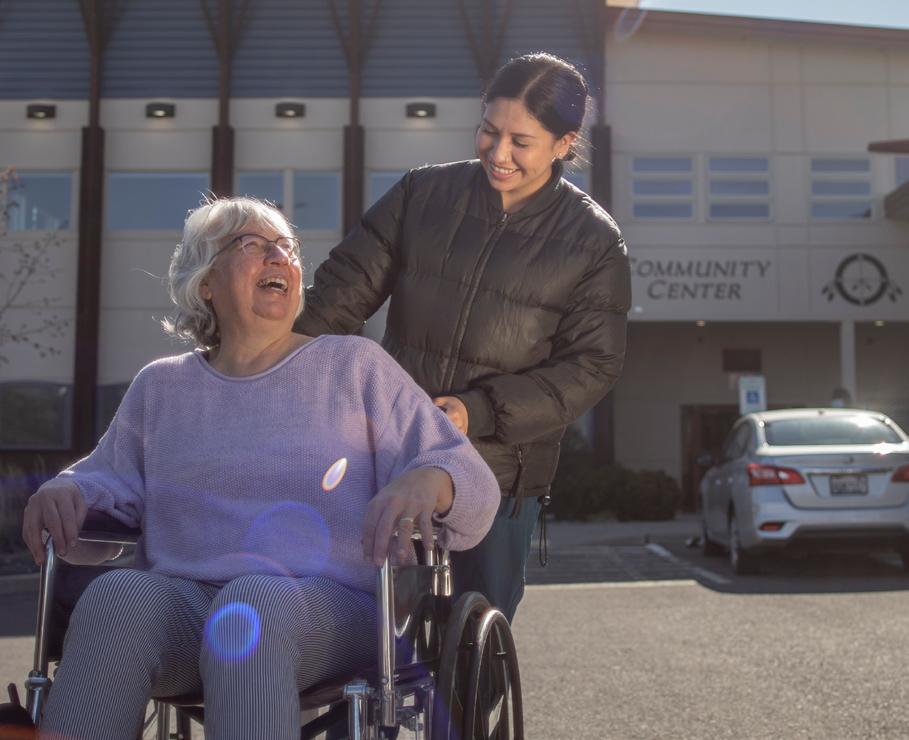
LEGISLATIVE UPDATE
The 2023 Washington State Legislative Session is quickly approaching. APS has prepared two bills for the upcoming session. The bills have been proposed in years past in ongoing efforts to advance chapter 74.34 RCW.

The first bill proposes a removal process for people placed on the Vulnerable Adult Abuse Registry. If passed, this would allow people who meet the criteria to be removed from the registry. We believe this is an important feature for the Vulnerable Adult Abuse Registry.





The second bill includes technical changes for the definition of individual provider and mandated reporter. It also proposes changes regarding exchanging information with other agencies and the public. This will increase the ability for APS to receive information from others as well as confirm whether APS has received reports.



APS has done extensive work with stakeholders to provide opportunities for input on the proposed language. We are pleased to have great support from many of our partners on both bills. We hope to continue to the momentum for these changes into the 2023 legislative session.
NAPSA



This July, NAPSA (National Adult Protective Services Administration) wrapped up a year-long marketing campaign with the goal to align terminology, messaging and overall understanding and awareness of APS across multiple states. Washington was one of ten states that participated in the campaign, thanks to the federal COVID grant funding. Over the course of the year, multiple meetings took place to align priorities, identify gaps in the general public’s understanding of APS, and ultimately define the vision of the project. NAPSA partnered with Marcomm, a marketing company who then made the vision come to life. The outcomes of the project include: an 80-second video on APS with 30-second and 15-second versions for commercials and other social media marketing as well as six focused resource sheets on the following topics: Mandated Reporting, Doing Our Part, and signs of abuse including neglect, selfneglect, financial exploitation, and physical and sexual abuse.
With the addition of these marketing tools our goal is to increase public awareness of APS including signs of abuse, what to do when you suspect abuse, and how APS can help. APS communications and marketing is under way to establish and roll-out a marketing campaign across the state over the next year that will also be paid for through a combination of grant funding sources.

When you have a moment, please watch the videos listed above. You may even see these videos in the near future on your local TV station! You can also access the PDF versions of the resource sheets here.
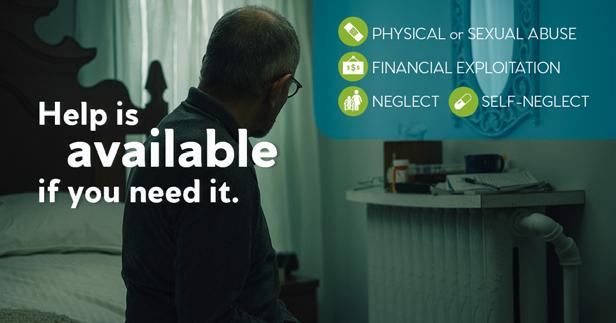




EQUITY, DIVERSITY, ACCESS, AND INCLUSION
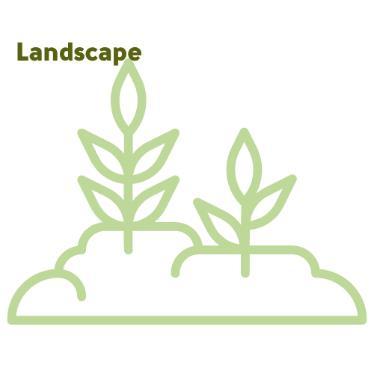
Pro-Equity Anti-Racism (PEAR)
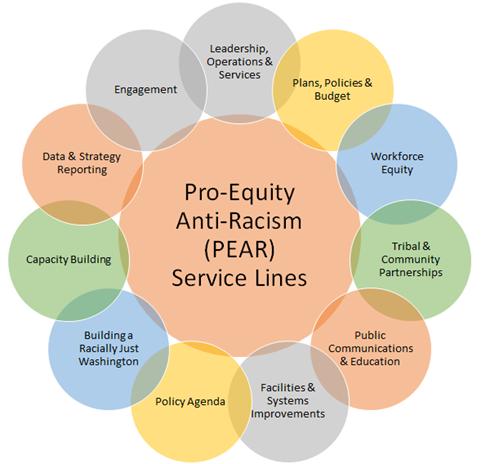
Executive Order 22 04 established the Pro Active Equity Anti Racism (PEAR) framework to address the exclusion, margina lization, and oppression of Black, Indigenous, People of Color, people with low income, immigrants and refugees, people living with disabilities and other groups which has resulted in deeply entrenched educational, economic and health inequities.
Executive Order 22-04 established the Pro-Equity Anti-Racism (PEAR) framework to address the exclusion, marginalization, and oppres sion of Black, Indigenous, People of Color, people with low income, immigrants and refugees, people living with disabilities and other groups which has resulted in deeply entrenched educational, eco nomic and health inequities.


DSHS PEAR SERVICE LINES
DSHS PEAR SERVICE LINE
PEAR Service Lines are government policies, practices, people, and systems that powerfully influence who is able to flourish and achieve their full potential. This is the landscape for PEAR work and is shaped by our values. There are 11 Pro-Equity Anti-Racism Service Lines that the PEAR Team collects data on, works to influence and reports progress on to the Washington State Office of Equity in our PEAR Equity Impact Review.

AL TSA LEAD PEAR CONSULTANTS Pakou Lee Morgan Olson Derrick Ross
Pro Equity Anti Racism (PEAR) Team
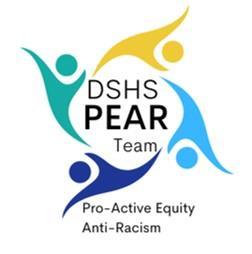
PEAR GOALS
DRIVE pro equity and social justice for all.
CENTER racial justice.
ENSURE equitable access.
BUILD a culture of belonging.
END disparities, including racial and ethnic disparities, to achieve equitable outcomes.
We will convene teams of employees and communities to prioritize hiring and promotions; state spend for public works, goods, and services (including client services), and procurement; and access to services.
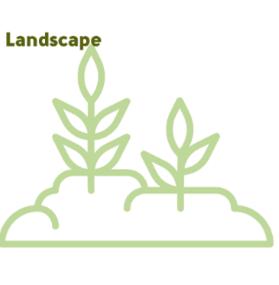
What does each of these goals look like in action to you?
Click here to share:
Natalie Boulos APS Workforce Development Specialist
HEADQUARTERS SPOTLIGHT
Natalie Boulos comes to us from the Oklahoma Health Care Authority HCBS/Waivers MFP Long-Term Services Department. During her nine-plus years of public service for OHCA, she established the “trade-school project” by using available grant funds to enhance, develop, and evolve the workforce for optimal recruitment and retention outcomes. Throughout her time with OHCA, Natalie developed the workforce committee that encompassed stakeholders from the private and public sector, as well as community partners to come together in a cohesive “fear free” platform with the end goal of enhancing the number of qualified work force applicants/current employees throughout the state to better represent some of the most vulnerable population.
Natalie initially went to school to be an Architect and has a natural passion for blue-sheets, program development, setting a strong foundation for growth, and working with community partners to reach a common goal. After the passing of a loved one, her passion quickly shifted, and she went back to school for a degree in health care administration with a focus in geriatrics. Her main goal is to be an advocate for vulnerable adults, so they have the resources and services they deserve to thrive within the community.
In her free time, Natalie loves to absorb the beautiful views of the mountain skyline, hike the valley of mountain ranges, watch the joy her children have when going down a slide in the local park, and visiting local espresso shops. She is excited to call Washington her new home!
TIVA 2 Updates
October - January – What’s ahead!
The next TIVA2 release is scheduled for September 30, 2022.
• APS Public Online Reports screen will have a new look and feel for the intake team.
• Intake supervisors will be able to reassign pending intakes.
• New checkbox and text field in person management allows staff to note when there are specific safety concerns other workers should be made aware of. When the Safety Indicator box is checked, a yellow Safety Indicator icon will appear next to the person icon in person search.
• New “AP relationship to AV” dropdowns are being added to the investigation and appeal sections. Investigators will be required to verify or update the AP’s relationship to the AV, when applicable. LBAs and Paralegals will also be required to verify or update the AP’s relationship to the AV when an investigation with an individual AP is closed with a substantiated finding. A one-pager will be provided closer to the TIVA2 release date.
• Reporters will be moved to their own search tab.
• AP’s name added to investigation header.
We are still working on the Risk Screening Tool design in TIVA2 which will allow us time for training in the coming months. We are on target to release the tool live in TIVA2 in December 2022.
inCident

BURNOUT
The work you do at APS can be challenging and at times, may be more stressful than others. When faced with times of higher stress, feelings of burnout may start to arise. While we have all heard about burnout, what is it really? The World Health Organization (2019) has defined it as “a syndrome resulting from workplace stress that has not been successfully managed. It is characterized by three dimensions: feelings of energy depletion or exhaustion, increased mental distance from one’s job or feelings of negativism or cynicism related to one’s job, and reduced professional efficacy.”
Burnout can be experienced by anyone and in any line of work. Since burnout is a gradual process, it is important to recognize the signs and symptoms one might experience. Signs and symptoms may include difficulty maintaining focus and finding that tasks take significantly more time; lack of patience and decreased frustration tolerance; lack of enthusiasm and feeling of detached from work; increased cynicism and negative outlook; exhaustion; and even pain and physical illness.
The good news is that there is a significant amount of research being conducted on strategies and interventions to prevent and recover from burnout. Elaine Cheung, PhD and her colleagues identified “Positive Emotion Skills Intervention” strategies to address burnout with critical care nurses. Additional research has shown that these intervention skills can be beneficial for other helping professionals. Cheung et al.’s (2020) intervention skills are quick, convenient, and easily integrated into a busy life:
• Noticing positive events and capitalizing: When there is a success or an accomplishment, big or small, take a moment to pause and celebrate.
• Gratitude: Find small things to be thankful for every day.
• Positive Reappraisal: Positive appraisal can be used to dispute excessively negative interpretations of an event and helps one find the silver lining in a situation.
• Mindfulness: Take time to focus on the present moment, in a nonjudgmental way through either formal meditation or informal activities.
• Personal Strengths: Recognize and appreciate one’s unique set of strengths, skills and talents, and acknowledge those of colleagues.
• Attainable Goals: By setting SMART (Specific, Measurable, Attainable, Realistic, and Time-bound) goals, one can build a sense of control and autonomy.
• Compassion Toward Others: Growing research shows that those who maintain emotional engagement with clientele and colleagues find greater meaning and fulfillment from their work.
• Self-Compassion: Be kind and understanding toward oneself, just as you would to others.
If you find yourself struggling with burnout or other stressors and would like to discuss these or other strategies, the CISM Program Managers are here to support you. Please don’t hesitate to contact either Rebeca Estrada or Chrystal Morisette.
Cheung, E.O., et al. (2020) Positive Emotion Skills Intervention
Address Burnout

Burn-out an “occupational phenomenon”: International Classification
Positive emotion skills intervention to reduce burnout
Diseases.
nurses.
Critical
Nurses. AACN Advanced Critical Care.
May) World Health Organization Link
Link
REGIONAL EMPLOYEE SPOTLIGHT
Amanda Green Investigator/ Social WorkerRegion 1

Amanda Green approaches her work and colleagues with an uplifting and encouraging attitude consistent with her philosophy to remain grounded, healthy, and “live life to the fullest and enjoy every moment.” We are thankful in Region 1 to have Amanda as an APS investigator in our Moses Lake office where she demonstrates her consistently positive outlook and supports her co-workers, community and vulnerable adults in a variety of ways.
Amanda has been a dedicated state employee for over 15 years and has found job satisfaction by helping people and working investigations. Amanda practices healing energy and yoga to help keep her mentally grounded and physically fit.
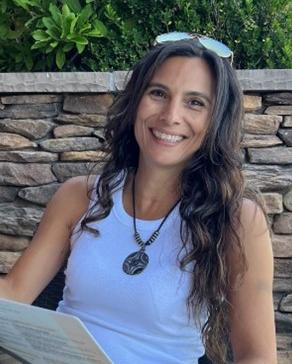
She has four sons and has been fortunate to have four grandchildren whom she adores and spends as much time as she can with. Amanda believes in the importance of giving back to her community and over the past 4 years she has done so as a voluntary elected Commissioner with Rural Hospital District 3 in Ephrata.

Micah Smith is everything you could want in an APS investigator and more! I have had the pleasure of having Micah on my team for 6 months and have been amazed at all that Micah does. His ability to prioritize his tasks, hone in on the important factors in an investigation and complete timely and thorough investigations in a way that makes my job easy! On top of managing his own caseload, Micah has been ready and willing to help and pitch in whenever he is needed. I hate to admit how many times I have asked him to complete a courtesy IFF at the last minute or have given him many reassignments (as many as 21 at one time!). He’s not afraid to advocate for himself, other staff and most importantly our vulnerable adult population. Micah is an asset to APS and we are lucky to have him! Continued on next page...
Micah Smith Investigator/ Social Worker
Region 2
Yellow Aster Butte at North Cascades | Photo by Jeff HollettRegion 2 Employee Spotlight continued

This is some of what his peers say about him, “Micah Smith has been an amazing addition to our team! Not only does he take care of his own workload, but he is always willing to help others. Micah has shown himself to be dependable, knowledgeable, and willing to go the extra mile not only for his clients, but for his coworkers, and he does so with an upbeat attitude.”
“Micah Smith has been an excellent mentor to me as new investigator. He has demonstrated a willingness to share knowledge and encourage questions with a positive welcoming attitude. Micah seems to approach their position of an investigator with the same inviting and personable mentality as I have witnessed firsthand how they are able to authentically build rapport with vulnerable adults. He is a credit to our division and the work that we do to serve others.”
Passion in Action
Adult Protective Services is a passion for Andy Kadima. In a reflection on his “Why,” Andy remem bers that in the country of his origin, social services and agencies like Adult Protective Services are not available. Vulnerable adults have no safety net like we have here in Washington.

Andy shared how someday he hopes to be a part of a solution in his home country to further elder and vulnerable adult protective services.
Andy Kadima
Manager
REGIONAL SUCCESS STORIES
REGION 1
COORDINATION RESULTS IN SAFETY FOR CLIENT
In April 2022, APS received a report concerning allegations of self-neglect, which included a vulnerable adult living in a home with a hoarding environment along with a significant problem with ants, an active fly farm and a substantial amount of rotten food.
During initial visits, the investigator learned that the alleged victim had untreated metastatic breast cancer, brain cancer, an open wound in their chest, and a tumor on the side of their head. The alleged victim was packing their wound with food wrappers, and tissues with live maggots. Our alleged victim also had some fixed delusions, believing they were a computer and therefore could not get wet and had not bathed in some time.

The APS investigator worked closely with Crisis Response, law enforcement, and community paramedics. They also filed an emergency conservatorship to assist in the services for our client who refused to leave their home. Our client was ultimately admitted to the hospital to evaluate the extent of their medical conditions.
While the client was hospitalized, hospital staff were able to start them on antipsychotic medication and took steps to improve hydration. The investigator used this time to continue to coordinate with Home and Community Services to secure an Adult Family Home placement with Hospice care for our client. The investigator demonstrated perseverance to overcome the many barriers to ensure the safety of our client.
REGION 2
IMPROVING QUALITY OF LIFE

A client was reportedly self-neglecting. They had a severe toe infection that led to an amputation due to delayed care. After visiting their residence, the APS investigator found their living environment very likely contributed to their poor health conditions. The condition of the home was also found to be a deterrent for any type of in-home caregivers. The client’s home appeared to be in a hoarding condition, with trash and debris covering all floors and surfaces in the home. The front stairs were rotting. The client was also found to be exhibiting paranoid and delusional thinking and was very tearful during the initial APS interview.
The investigator reviewed protective services with the client. They were interested in pursuing LTC services, Meals on Wheels, applying for SNAP benefits and assistance with paratransit. The investigator patiently assisted them with all those applications and followed up to ensure services started. The investigator contacted a nonprofit who agreed to do a clean out of the client’s home while the worker obtained covid funds for a dumpster. The nonprofit cleaned out the home, made repairs, and had a contractor install a new stove with the use of additional covid funds.
REGION 3
TRANSFORMING LIVES THROUGH TEAMWORK
Being a team player is a commendable goal for all of us in Adult Protective Services, and occasionally, we identify members of our team who exemplify excellence in action. Sometimes an individual goes the extra mile to support an entire regional team.
One of our investigators closed 77 quality cases within a month and accepted a supervisory role in a struggling office. They learned and acclimated quickly to support the Bremerton leadership team, and promptly identified ways to support the office.
They also volunteered to be the primary for face-to-face visits, driving weekly to engage with vulnerable adults. They then accepted a supervisory role in Port Angeles.
When asked, they are the first to indicate that everything they do is for the greater good, taking strategic steps to support the Adult Protective Services team. Whether engaging in face-to-face visits for Port Angeles or supporting approvals for their team.
“Professionals like this, work hard to keep the entire region running smoothly and transforming lives!”
UPDATES & INFORMATION
Risk screening tool update

The alleged victim risk screening tool was developed under the 2019 Elder Justice Act Grant to Enhance Adult Protective Services from the Administration for Community Living. The development and deployment of this tool is one of main objectives under this specific grant for APS.
This screening tool was pilot tested with a small group of field staff in early 2021 and has been reworked from the feedback received during and after the pilot test. The tool was originally planned for release and incorporation into APS policy in December 2021, but due to the ongoing contingency plan as well as staffing levels in each region, the release was delayed until November 2022.
There will be a series of webinars in November where all current APS staff will receive training on the tool. Additionally, an MB on the risk screening tool will be released outlining the new policy and procedure for the tool.

Lastly, the tool is currently being built into TIVA2 by our developers and it is planned to be live in the December 2022 release. Once the tool is live in TIVA2, all staff will be expected to use it moving forward.
Please stay tuned for additional information about trainings and the release of this tool in the coming months.
Small grant update
Grant work on multiple and varied projects continued throughout the summer. Each grant is listed below along with major projects relating to it.
Elder Justice Act – Grants to Enhance Adult Protective Services
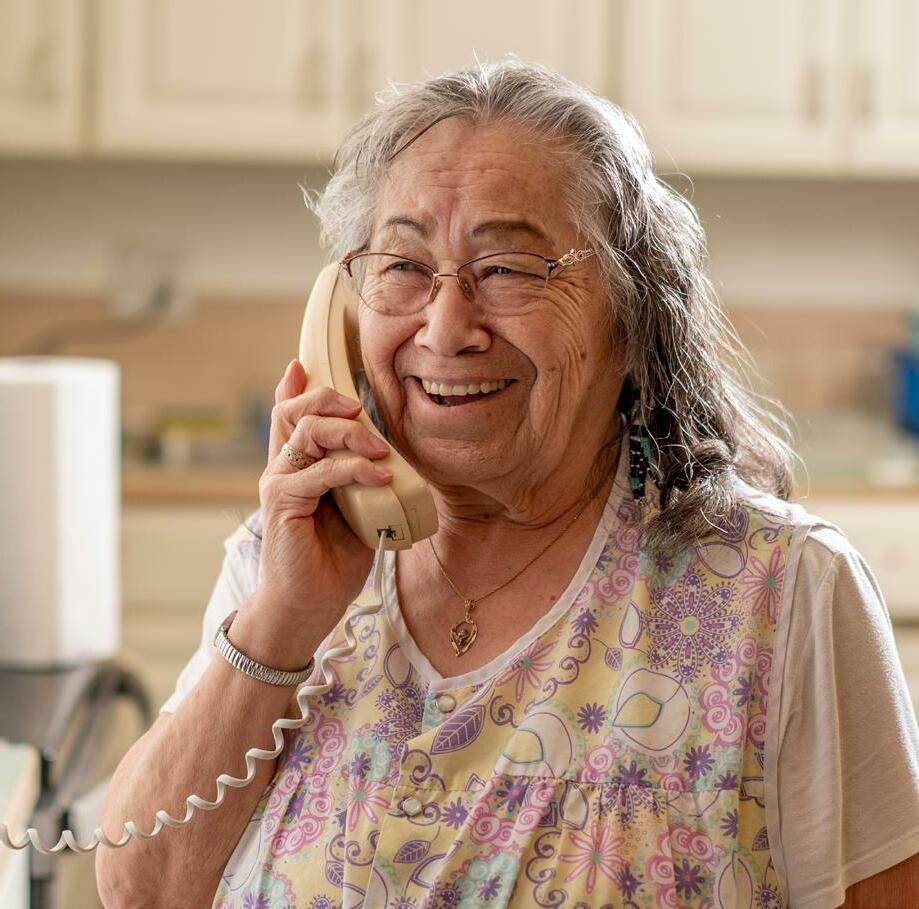
• Forensic interviewing training continues for all existing and new APS staff and will continue. Additional videos on the technique were developed and will be used in the training moving forward.
• ADvancing States has provided a findings paper on selfneglect based on staff interviews, a multi-state survey, and multiple focus groups.
• The risk screening tool training plan has been finalized and the tool will go live in late 2022.
INFORMATION
COVID Response and Relief
• Regions continue to utilize funding to make direct goods purchases for alleged victims. To date, APS has spent $66,038 to support 249 alleged victims.
• Mental Health First Aid trainings are being offered to all APS staff by APS-certified trainers.
• A targeted marketing campaign is being developed for areas of the state with a high percentage of older adults and historically low reports to APS.

American Rescue Plan I
• The full program evaluation with the University of Washington was approved by Washington State’s IRB and an APS all staff survey will be released in early Fall to gather information on all aspects of the program. Several states were selected to stand in comparison to Washington’s program for the evaluation and will inform the final recommendations that the evaluators will provide at the conclusion of the project.
• The Quality Assurance team developed an expanded list of QA questions that focus on the qualitative measures of APS investigations and they began their review of completed APS cases.

• 5 federally-recognized Tribes have entered into contracts with APS in order to serve their vulnerable adult populations through marketing, code development, and direct goods purchases.
American Rescue Plan II
Lastly, as of July 2022, APS received a fourth grant – American Rescue Plan II – to continue the work of enhancing the program. This new opportunity has added an additional $3.4 million to the grants budget. This majority of this funding will be spent on fulltime staff positions to be divided between the three APS regions with the excess funding going towards training costs as well as goods and services purchases for alleged victims.
If you have questions about any of the grants or grant activities, contact Victoria Gawlik Morse.

MENTAL HEALTH

AID
Mental health issues are highly prevalent in the US with approximately 1 in 5 adults (52.9 million people) experiencing mental illness each year. The people experiencing mental illness can be our family, friends, coworkers, community members, and clients.
Unfortunately, awareness and acceptance hasn’t caught up with the prevalence. Most often, we simply don’t talk about it. This can lead to misconceptions, fear, and stereotypes. Have you ever known someone (even yourself) that didn’t want someone to know they were experiencing a mental health challenge out of fear or embarrassment? The stigma surrounding mental health challenges is often a barrier for individuals to seek support. In these situations, we may try to manage it by ourselves or maybe even hope that it will go away on its own. This can be a lonely journey for anyone who experiences this. These people, just like you work, perform, create, compete, laugh, love, and inspire every day….while experiencing unseen challenges.
Mental Health First Aid (MHFA) describes stigma towards mental illness as negative attitudes (prejudice) and negative behaviors (discrimination). In the US, over 50% of those with clinical level mental health risks do not seek help. And, 25% of those not seeking treatment (that’s 13.2 million people) report it is due to not wanting others to know. The average time it takes for an individual with a mental illness to seek help is 11 years from the onset of symptoms. This is far too long. This is stigma in action, and it can lead to people feeling too ashamed to discuss their symptoms or seek treatment and prevent recovery. This is an unfortunate problem…. but, we can help. Many people may also be unaware they are experiencing a mental health challenge. There’s no simple test the same way we can test blood sugar levels for diabetes. Each condition has its own set of unique symptoms, which can often overlap. It’s important to encourage individuals to recognize symptoms and seek appropriate support and treatment. The first step to destigmatizing mental health is creating awareness.
Mental Health First Aid (MHFA) can help. Participants are taught how to respond to those experiencing mental health challenges in a caring, respectful and compassionate manner. There is well-established evidence that MHFA training improves knowledge about how to support someone experiencing or developing a mental health problem.
Mental health challenges can have a particular impact on
the people we serve:
• Only 46.2% of U.S. adults with mental illness received treatment in 2020
• 155 million people live in a designated Mental Health Professional Shortage Area
• People with depression have a 40% higher risk of developing cardiovascular and metabolic diseases than the general population. People with serious mental illness are nearly twice as likely to develop these conditions.
• The rate of unemployment is higher among U.S. adults who have mental illness (6.4%) compared to those who do not (5.1%)
• At least 8.4 million people in the U.S. provide care to an adult with a mental or emotional health issue
• Caregivers of adults with mental or emotional health issues spend an average of 32 hours per week providing unpaid care
• 32.1% of U.S. adults with mental illness also experienced a substance use disorder in 2020 (17 million individuals)
This is why APS has committed to making these trainings available to all staff. In 2021, using grant funds, we were able to train 13 staff to become certified MHFA trainers. With the help of these dedicated individuals, we hope to train APS staff across the state, increasing awareness exponentially. For our first year, we aim to have 200 staff trained. In our second year, this goal will increase to 600 staff. We are counting on each of you to help us reach this goal.
We are launching the MHFA trainings starting in September. We are very pleased to say that we will have a full class! There are plenty of opportunities to participate. Classes will be offered on a monthly basis and available to all staff within APS and HCS (with supervisor approval). Each class includes 1 day of interactive class time (virtually) plus a couple hours of self-paced work. We recognize this is a significant time commitment, but we also see it as a valuable investment for our staff and communities.
Interested in attending? Click HERE to register.
Want more information? Visit our MHFA sharepoint page. Still not sold? Check out these statistics: Mental Health
By the Numbers | NAMI: National Alliance on Mental Illness

GETTING TO KNOW ONE ANOTHER
Understanding how our unique experiences contribute to a diverse workforce

MIGUEL PEDROZA - APS INVESTIGATOR, REGION 1
Miguel Pedroza is an APS Investigator working out of the Union Gap/ Yakima Office. Miguel began his career with Adult Protective Services at the height of the COVID-19 pandemic in October 2020. He was first drawn to public service at an early age. “My parents were born in Mexico, so when all their families moved to the United States for work, I always noticed how they treated each other,” said Miguel. “They were always willing to help each other out.”
Miguel’s aunt was a teacher at a local elementary school and often asked Miguel for help. Working with elementary school students set Miguel on a path to becoming a teacher. But life had other plans for Miguel. He found himself in a job during college that ignited a passion for people that was entirely unexpected. “It wasn’t until I was in college that I started to work with more of the vulnerable population and really fell in love with it,” said Miguel.
Miguel began working with children with developmental disabilities in a group home setting in Spokane. Children were placed in the home due to behavioral and anger issues, with the goal of learning replacement behaviors. “Once they reached a certain level, they could return home to their family,” said Miguel. “So that sparked my interest because I’ve always worked with kids my whole entire life, and that was the first time I’ve worked with kids with developmental disabilities.”
As with many people in 2020, the pandemic disrupted Miguel and his family’s lives. Miguel could no longer work with vulnerable children due to stay-at-home orders and facility closures. The news took a toll on Miguel, but he decided to face adversity head-on and begin looking for other ways to apply his talents to help Washington’s most vulnerable. That’s when he applied to Adult Protective Services. “I saw this posting for Adult Protective Services, and I was like, wow, that’s really up my alley,” said Miguel.
A passion for helping people drives Miguel as he serves the people living in the Yakima/ Union Gap area. He believes his background and skillset have uniquely prepared him for his current role as an APS Investigator. “Most of my clients are Spanish speaking and work in agriculture,” said Miguel. “It’s a good way for me to communicate with them in their native language and bond with them by relating my similar background and experience.”
When Miguel’s not working to help Washington’s vulnerable adults, he loves spending time with his wife Jalisa and their children, Easton and Emmie. As a family, they like going to the zoo, visiting flea markets, and exploring new places around Washington.

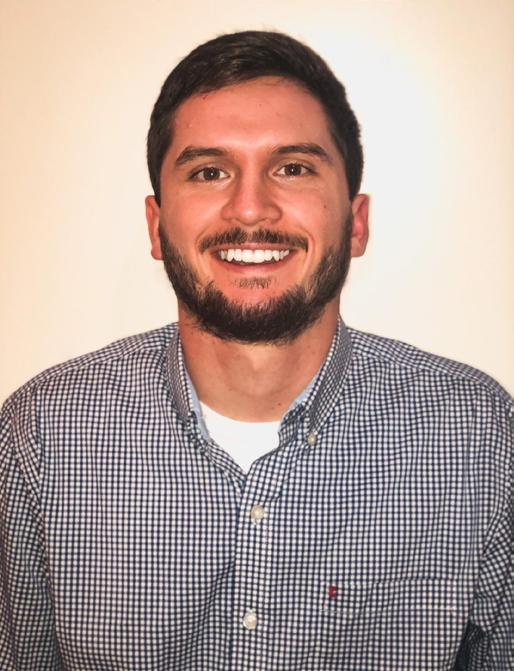
“I love my job, and there are always people out there who have it worse than we do. So, every day I’m excited to go to work and see who else I can help out.”
UPCOMING | APS EVENTS
All
and
REGION 1
Gap
2
Director
Wednesday, October 12 Thursday, October 13
October 20 Thursday, October 27

3
Coffee Break
October 4
October 19
- 12:00pm
- 12:00pm
- 3:30pm
- 11:00am
- 3:00pm
- 11:30am
MEETINGS
Grab a cup of coffee and call-in to chat with APS Director Kathy Morgan!

This casual chat is the perfect opportunity to learn about what’s new with APS and ask any question you’d like!

Want to learn more about employee engagement, training, roadshow updates or Kathy’s favorite restaurant? Ask away! She’s happy to chat about anything.
October
Wednesday, October 5, 1pm-2pm
Tuesday, October 18, 1pm-2pm
November 2, 1pm-2pm
November 9, 9am-10am
Wednesday, December 7, 1pm-2pm
December 21, 9am-10am
*Starting January 2023 recurrence on the 2nd and 3rd Wednesday of each month

